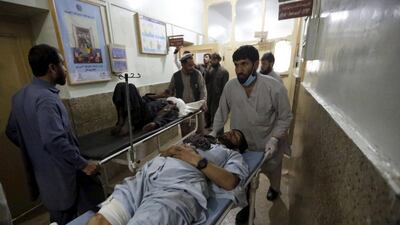ASADABAD, Afghanistan // They were three brothers who spent years working as street vendors in eastern Afghanistan, desperately trying to save enough for a new family home.
But on the morning of February 27, Habibullah, Ehsanullah and Rohullah fell victim to the violence they had known all their lives, innocent bystanders in a suicide bombing with murky origins in the country’s past.
Although the exact reason for the attack in Kunar province is unclear, and no one has claimed responsibility, its roots run through decades of war and political intrigue – from the anti-Soviet resistance of the 1980s to the US hunt for Osama bin Laden and the current fight against the Taliban.
The brothers worked near the governor’s office in Asadabad, the capital of the province close to the border with Pakistan, selling soup, chips and pakora from a streetside stall.
They came from a family of five sons and their uncle, Gul Akbar, was drinking tea in a nearby market where he has a shop when he heard the explosion that day.
He thought it might be the sound of a mortar fired by the Taliban at a government checkpoint in the surrounding mountains – a fairly routine occurrence in Asadabad. But when someone told him the attack was near the governor’s office and the police headquarters, he went straight to the scene.
“When I looked at the place our children worked, it was covered in black smoke,” he said. “There were no flames but the whole place was dark and covered in black smoke.”
Unable to find his nephews, Mr Akbar rushed to a local hospital where he first saw the body of Habibullah – the eldest of the three – in the morgue. Lying beside him was the corpse of the youngest of the three, Rohullah, who was in his early- or mid-20s.
Shocked at the sight, Mr Akbar fell into a kind of trance, “like when you unplug a fan and the fan stops”.
He found his other nephew, Ehsanullah, clinging to life in an operating theatre. Ehsanullah eventually died in an ambulance taking him to another hospital for further treatment. Another brother, Jaffar, and a cousin were injured in the attack.
All three brothers were married, with children of their own. They had lived together in their new four-room house in the neighbouring district of Marawara for several months and were still paying back a debt from buying some of the building material.
However, they were optimistic that business would pick up in the spring and summer. Two of them had also decided to attend evening classes in a belated effort to pursue high school education.
At least 14 people were killed in the suicide attack. Among them was a prominent former mujahideen commander, Haji Sahib Khan Jan, who is believed to have been the main target.
Jan had long-standing ties with Hizb-e-Islami, one of the largest mujahideen parties in the anti-Soviet resistance of the 1980s.
The party retains significant support in many areas of Afghanistan. But for more than a decade, it has been divided between members who favour mainstream political engagement and others who openly advocate armed resistance to US and Nato troops. This caused them to split into several factions that are officially unaffiliated.
Jan’s ties with Hizb-e-Islami were well known but he supported the government and was widely respected in Kunar.
No one claimed responsibility for the suicide bombing but Jan’s background meant he had some powerful enemies.
His family told The National he took up arms against the Taliban last year in his home district of Dangam, east of Asadabad. But the government failed to back him in the fight and his resistance lasted only four days.
Jan sought refuge in the mountains on the border with Pakistan, where he was arrested by Pakistani forces with 33 of his men. They were held for two and a half months before being handed over to the Afghan government. After returning to Kunar, Jan settled in Asadabad.
On the day of his assassination, he was on his way to mediate in a land dispute between two branches of his tribe. While some reports indicated the bomber was on a motorcycle, one of his relatives said a man was seen approaching Jan on foot and talking to him just before the explosion.
Jan’s nephew, who doubled as his bodyguard, was also killed in the attack, as was a friend who was a former member of the mujahideen.
In a glowing tribute to Jan, the leader of Hizb-e-Islami’s militant faction, Gulbuddin Hekmatyar, blamed the Taliban for his death, accusing them of selling out the country.
The animosity between Mr Hekmatyar and the Taliban dates back to the Afghan civil war of the 1990s. While they both oppose the presence of American and Nato troops in Afghanistan, the two groups have fought each other in recent years after a brief rapprochement.
Adding another layer of intrigue to the case, Mr Hekmatyar said Jan had sheltered Osama bin Laden and the current Al Qaeda leader, Ayman Al Zawahiri, following the 2001 US-led invasion of Afghanistan.
Mr Hekmatyar’s faction of Hizb-e-Islami has often held peace talks with the government and is currently engaged in a new round of negotiations with officials in Kabul.
Exactly why Jan was killed and who ordered his death may never be revealed, but his family is convinced they know where the blame lies.
“He was trying to bring security to our society so the Taliban targeted him to finish all this before it started,” said his nephew, Mawlawi Mursaleen.
foreign.desk@thenational.ae
* Chris Sands contributed to this story from the UK

